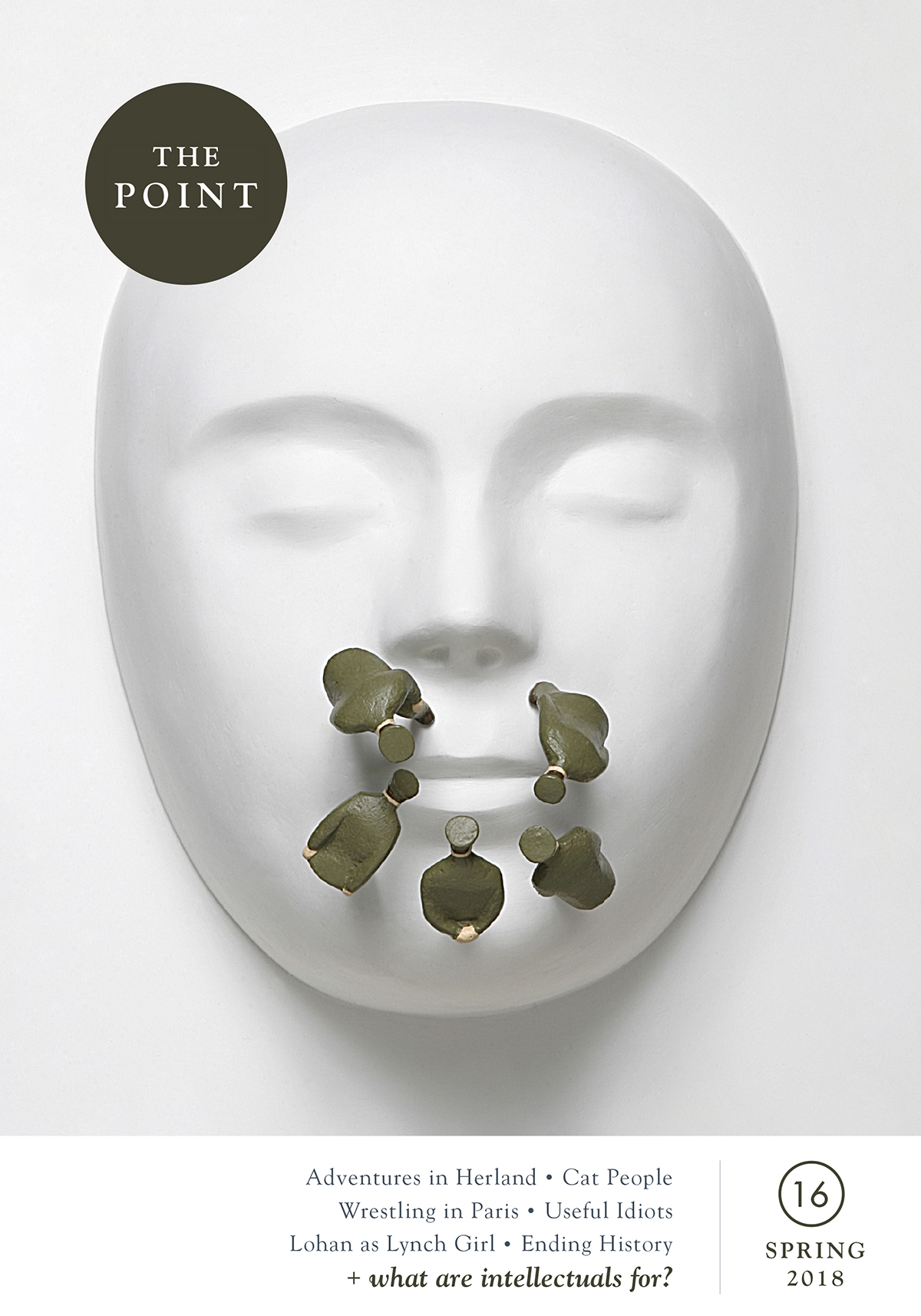The Point 16: What are intellectuals for?
by
multiple authors
(editors)
The Point 16: What are intellectuals for?
by
multiple authors
(editors)
parochial
(en)
relating to a church parish; having a limited or narrow outlook or scope
the same parochial suspicion of belief systems strong enough to grapple with America's intrinsic egoism
the same parochial suspicion of belief systems strong enough to grapple with America's intrinsic egoism
The end of history, Fukuyama wrote, was not the end of historical events, but the end of ideological conflict. But once the end of history has been revoked, a renewal of the possibilities of ideology to enhance narrative should not be far behind. Reality under the Trump administration truly is hysterical, and any meaningful literary response to it should probably take into account how we—that nebula of left-leaning literary types to which Batuman and I and everyone who reviewed or cares about reviews of The Idiot belong—put up with so many patently mediocre fictions for so long. This isn’t to suggest that novelists should dive headfirst into professions of socialist faith. Certain authors have already shown the limits of such an approach. It is not a question of advocating one belief or another, but of examining their implications through the vessel of dramatic narrative. It’s not to discount the existence of types of novels other than the ideological, nor to overlook the gifted fiction writers who already know how to fuel their narratives with zealous idiocy, self-centered or otherwise. Junot Díaz, Tao Lin, Adelle Waldman, Alexandra Kleeman and Paul Beatty have all demonstrated how foolish true believers can push novels forward onto territory that blatant author surrogates, burdened by intelligent inaction, could never reach.
These are unsettling times. Tensions and pressures formerly pacified by the prospect of endless growth now draw force from a state of permanent stagnation. Established institutions tremble with the resentful energies of dishonored promises; each crisis barely averted sows the seeds for more inevitable confrontation. Yet if literary history is any indication, an era of collapsing order offers fertile ground for novelists. Shaken by events out of inertia and conformity, they waken to a world teeming with open inquiries and untested solutions; whether facing the window, the mirror or the other, certainties dissolve. The pressing question is no longer how to fit in with the given, but how much must be changed. The temptation to wager one’s existence on an unrealized social ideal grows ever more alluring. So, too, grows the inclination to review one’s ideals and imagine their implications writ large. The unique quality of the novel catalyzed by ideology is its range, its capacity to simultaneously circumscribe the horizons of belief, exercise the full freedom to maneuver in society, and gauge its potential to foster individual maturity. It’s the best, if not the only, instrument left to us to understand what we are becoming.
wow. think about this
The end of history, Fukuyama wrote, was not the end of historical events, but the end of ideological conflict. But once the end of history has been revoked, a renewal of the possibilities of ideology to enhance narrative should not be far behind. Reality under the Trump administration truly is hysterical, and any meaningful literary response to it should probably take into account how we—that nebula of left-leaning literary types to which Batuman and I and everyone who reviewed or cares about reviews of The Idiot belong—put up with so many patently mediocre fictions for so long. This isn’t to suggest that novelists should dive headfirst into professions of socialist faith. Certain authors have already shown the limits of such an approach. It is not a question of advocating one belief or another, but of examining their implications through the vessel of dramatic narrative. It’s not to discount the existence of types of novels other than the ideological, nor to overlook the gifted fiction writers who already know how to fuel their narratives with zealous idiocy, self-centered or otherwise. Junot Díaz, Tao Lin, Adelle Waldman, Alexandra Kleeman and Paul Beatty have all demonstrated how foolish true believers can push novels forward onto territory that blatant author surrogates, burdened by intelligent inaction, could never reach.
These are unsettling times. Tensions and pressures formerly pacified by the prospect of endless growth now draw force from a state of permanent stagnation. Established institutions tremble with the resentful energies of dishonored promises; each crisis barely averted sows the seeds for more inevitable confrontation. Yet if literary history is any indication, an era of collapsing order offers fertile ground for novelists. Shaken by events out of inertia and conformity, they waken to a world teeming with open inquiries and untested solutions; whether facing the window, the mirror or the other, certainties dissolve. The pressing question is no longer how to fit in with the given, but how much must be changed. The temptation to wager one’s existence on an unrealized social ideal grows ever more alluring. So, too, grows the inclination to review one’s ideals and imagine their implications writ large. The unique quality of the novel catalyzed by ideology is its range, its capacity to simultaneously circumscribe the horizons of belief, exercise the full freedom to maneuver in society, and gauge its potential to foster individual maturity. It’s the best, if not the only, instrument left to us to understand what we are becoming.
wow. think about this

